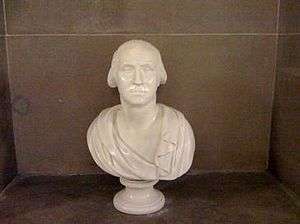George Washington (bust by Houdon)
| George Washington (Houdon) | |
|---|---|
 | |
| Artist | Copy of Houdon bust |
| Year | 1932 |
| Type | bust, sculpture |
| Dimensions | 64 cm × 46 cm × 46 cm (25 in × 18 in × 18 in) |
| Location | Indiana Statehouse, Indianapolis |
| Owner | Indiana Historical Bureau |
George Washington (bust by Houdon) is a public artwork that is a limited edition copy of an original bust created by French neoclassical sculptor Jean Antoine Houdon[1] that is on display inside the Indiana Statehouse, which is located in Indianapolis, Indiana, United States. The artwork was cast a solid piece of plaster that has been painted white.[2]
Description
This piece is a bust of the first President of the United States, George Washington. It is made of white plaster, and its dimensions are 25 inches (64 cm) by 18 inches (46 cm) by 18 inches (46 cm).[2] Washington is portrayed in a toga type drape, gazing upward to the proper left. Washington has no facial lines, and his hair is swept to the rear of his head in a pony tail. On the rear of the bust's base an inscription that reads "1732-1932 George Washington Bicentennial Commission." This bust is a copy of an original bust created from life by French sculptor Houdon.
Historical information
George Washington was one of the Founding Fathers of the United States, and the First President of the United States. Washington was a statesman, soldier, and surveyor. He was also the Commander-in-chief the Army from June 15, 1775 to December 23, 1783 then again from July 3, 1798 to December 14, 1798. Washington was elected President of the United States and served in that role from April 30, 1789 until March 3, 1797.[2]
The original bust was sculpted by French sculptor Jean Antoine Houdon in 1785 at George Washington's home, Mount Vernon, in Virginia. It is believed that Washington posed for the original sculpture. This bust was used as the primary image of George Washington for the Bicentennial Celebration of the first president's birthday in 1932, which was held from February 22 until Thanksgiving of the same year. The inscription on the rear of the bust refers to the Bicentennial Commission that was formed to oversee the celebration. The Chief Executive Officer of the Commission was the Honorable Sol Bloom, who was a member of the US Congress from New York State. President Herbert Hoover was the Chairman of the commission.[1]
The legal status of this piece is the Statehouse Inventories, and the credit line is through the Indiana Historical Bureau with an identification number of 99.2006.020.0069.[2]
Location history
Originally, this piece was sighted as being placed in an alcove on the second floor of the Statehouse building, on the outside of the rotunda. It also used to have a bronze nameplate underneath.[2] Currently, the piece sits in an alcove on the 4th floor of the Indiana Statehouse, and the bronze name plate is not currently being displayed with the bust.
Artist
Jean Antoine Houdon was born March 20, 1742 in Versailles. He was a sculptor in the Neoclassical style and is considered to be the most famous sculptor of the latter half of the 18th century in France.[3] Houdon was famous for his busts and portrait statues of inventors, philosophers, and political figures of the Enlightenment. Houdon also created sculptures of other famous American founding fathers, including Benjamin Franklin and Thomas Jefferson.
Condition
The current condition of the sculpture is good, per assessment completed in April 2006.[2]
See also
- Abraham Lincoln (Jones)
- Ashbel Parsons Willard (Dexter)
- Daniel W. Voorhees (Voorhees)
- George Rogers Clark (McLary)
References
- 1 2 Bloom, Sol. "The George Washington Bicentennial Celebration." Advocate of Peace through Justice 93.3 (1931): 162-65. Print.
- 1 2 3 4 5 6 Fletcher, S., and T. Cromwell. File://C:Documents and SettingstcromwellLocal SettingsTempxgprn.htm. Indianapolis, 25 Sept. 2006. HTM.
- ↑ New Advent Catholic Encyclopedia. "Jean-Antoine Houdon". Retrieved 4 December 2010.
External links
- Photograph of bust in context of alcove and rotunda.
- Close up photo of proper right of bust.
- Detail photo of proper right of bust.
- Detail photo of rear base inscription.
- Detail photo proper left of bust.
- Photo of bust in alcove-note bronze descriptive plate absent.
- The Morgan Library Collections-Catalogue entry for George Washington's living mask created by Houdon.
- See additional photos of this piece and other works at the Indiana Statehouse.
- Photos and information on other artworks by Houdon
- The Art Institute of Chicago
- The J. Paul Getty Museum
- Indiana Statehouse Tour Office
- l'Écorché (Flayed Man) by Houdon
- The Metropolitan Museum of Art
- Mount Vernon
Coordinates: 39°46′07″N 86°09′45″W / 39.76848°N 86.16254°W